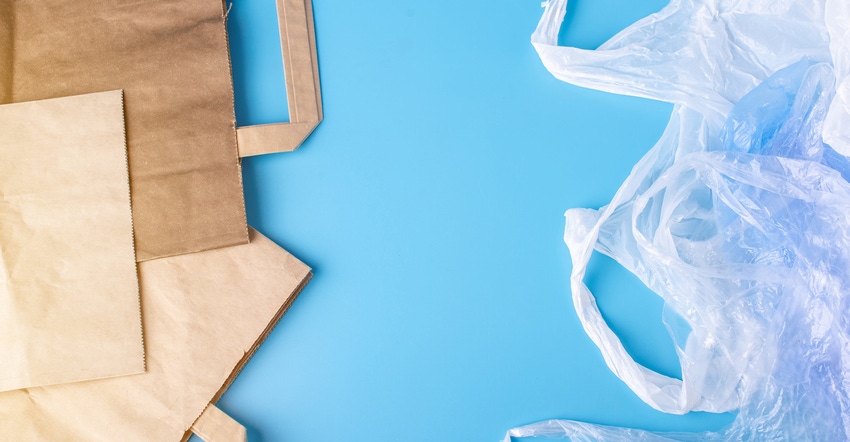New Jersey has passed the most wide-ranging ban on retail bags in the country.
September 29, 2020

In New Jersey, there’s no longer a choice at the checkout counter in retail stores: Both paper and plastic retail bags have been banned statewide. The measure seeks to appease an “influential” supermarket trade group that fought the plastic bag ban’s approval earlier this year because paper bags were more expensive to provide to customers than plastic bags.
I guess you could say that there’s now a level playing field between plastic and paper retail bags, since all single-use bags are banned.
There are three components to the bag ban bill, according to a report in northjersey.com:
Film plastic bags of any thickness are banned as are paper bags at supermarkets over 2,500 square feet.
Polystyrene clamshell food containers and other products like plates, cups, food trays, and utensils are banned.
Plastic straws are available only upon request at restaurants.
Prior to the vote on Sept. 24, Linda Doherty, President of the New Jersey Food Council, commented that without a ban on paper bags, as well, “consumers will simply move to single-use paper bags and we will not address the underlying goal of reducing our reliance on single-use products.”
One thing the bill does achieve is to override a patchwork of dozens of bills throughout New Jersey municipalities. The ban on plastic and paper bags and expanded polystyrene (EPS) foam food containers will take effect 18 months after it is signed into law.
The law includes a number of exemptions, according to northjersey.com:
Reusable plastic (nonwoven polyethylene) bags with handles, which are sold at many retail stores;
bags used solely for uncooked meat, fish, or poultry;
bags used for loose items such as fruits, vegetables, nuts, coffee, grains, baked goods, candy, greeting cards, flowers, or small hardware items;
bags used to carry live animals such as fish;
bags used solely to contain food that has been sliced or prepared to order, including soup or hot food;
laundry/dry cleaning or garment bags;
bags carrying prescription drugs;
newspaper bags.
After a ban on foam containers takes effect, other products made from the same polystyrene material “would have another two-year grace period before being banned,” said northjersey.com’s report. Those include disposable, long-handled PS foam spoons for thick drinks; small cups of two ounces or less used for hot foods; trays for raw meat, poultry, or fish commonly used in supermarket meat sections; and any food pre-packaged in EPS by the manufacturer, such as ramen noodles.
After the bill takes effect, a first violation would get a warning; a fine of up $1,000 for a second offense and a fine of up to $5,000 for a third or subsequent offense would be levied on violators.
Manufacturers bite their tongues
Doing some research on bag manufacturers in New Jersey, I found a few — both paper and plastic bag makers. None of the plastic bag manufacturers I spoke with wanted to say anything. I don’t blame them. When people are gunning for you, why stick your head out of the foxhole? One person, who spoke on condition of anonymity for him and his company, said “It’s ridiculous. Paper is environmentally friendly. I think the ban will be hard to implement, but I will watch with interest to see if this ultimately goes through.”
Obviously, the intent is good: Getting rid of plastic and paper waste in the environment, especially along New Jersey’s shore line. Of course I’m sure that not all of that trash comes from the good citizens of New Jersey. Some probably washes down from New York or other neighboring states that don’t have these bans.
After all the EPS and polystyrene containers are gone, and paperboard containers are in use, there will be a hue and cry about the PFAS in the polymer lining of the paperboard to prevent leakage of the contents. Then, like New York, New Jersey will have to ban all lined-paperboard containers because of the supposed harm to humans of PFAS, which is not backed up by science.
Nothing is all good and nothing is all bad. Everything in life — including every product we use no matter the material — has pros and cons. What will be the consequences on the other side of the coin when all plastic and paper single-use items are banned? Returnable and reusable? That’s been tried in California, as I’ve written about before.
You get your take-out in reusable/returnable bowls, then take them to a public drop-off point, where the coffee shop will pick them up, wash and sterilize them, and reuse them. I’m not sure how that’s been working since the pandemic. It’s not very eco-friendly, either, given the energy you use driving your empty dishes to a drop-off location that then have to be picked up, using more energy and other resources for the hot water and soap to ensure their cleanliness.
Bans rarely work. People will bring in plastic and paper bags, EPS containers, and so forth from neighboring states, unless New Jersey sets up border patrols to intercept the forbidden items. Or maybe the state could build a wall. I’ve heard that works.
About the Author(s)
You May Also Like




